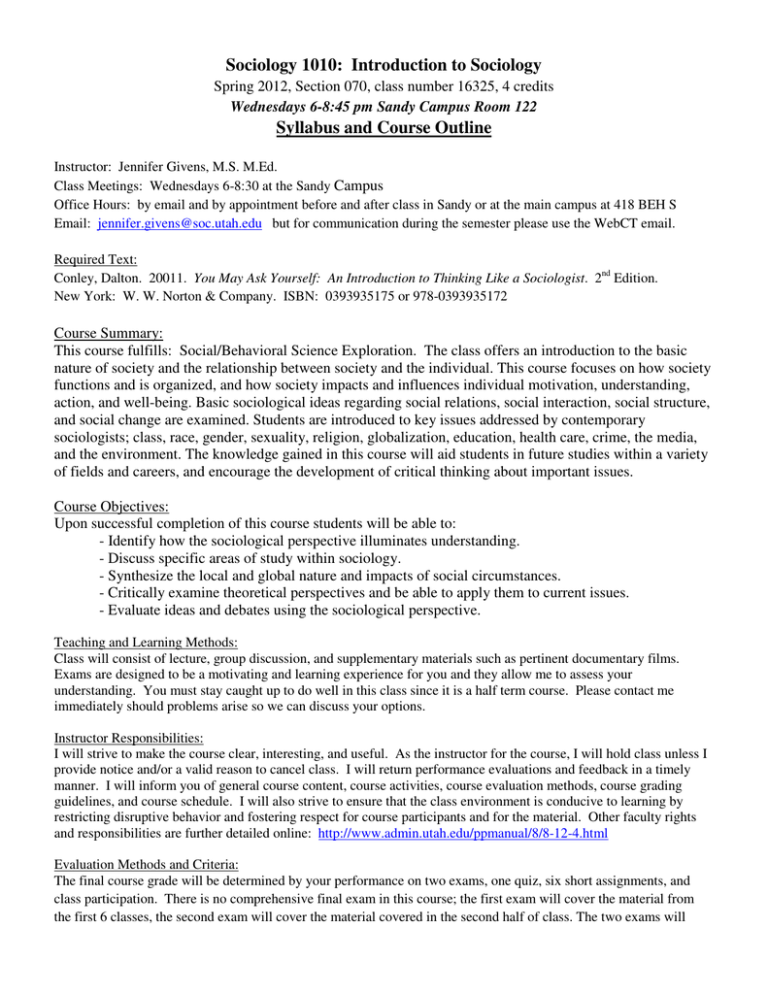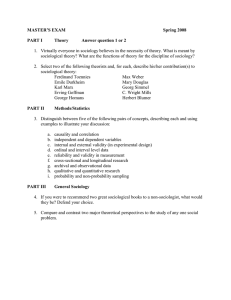Introduction to Sociology Syllabus and Course Outline
advertisement

Sociology 1010: Introduction to Sociology Spring 2012, Section 070, class number 16325, 4 credits Wednesdays 6-8:45 pm Sandy Campus Room 122 Syllabus and Course Outline Instructor: Jennifer Givens, M.S. M.Ed. Class Meetings: Wednesdays 6-8:30 at the Sandy Campus Office Hours: by email and by appointment before and after class in Sandy or at the main campus at 418 BEH S Email: jennifer.givens@soc.utah.edu but for communication during the semester please use the WebCT email. Required Text: Conley, Dalton. 20011. You May Ask Yourself: An Introduction to Thinking Like a Sociologist. 2nd Edition. New York: W. W. Norton & Company. ISBN: 0393935175 or 978-0393935172 Course Summary: This course fulfills: Social/Behavioral Science Exploration. The class offers an introduction to the basic nature of society and the relationship between society and the individual. This course focuses on how society functions and is organized, and how society impacts and influences individual motivation, understanding, action, and well-being. Basic sociological ideas regarding social relations, social interaction, social structure, and social change are examined. Students are introduced to key issues addressed by contemporary sociologists; class, race, gender, sexuality, religion, globalization, education, health care, crime, the media, and the environment. The knowledge gained in this course will aid students in future studies within a variety of fields and careers, and encourage the development of critical thinking about important issues. Course Objectives: Upon successful completion of this course students will be able to: - Identify how the sociological perspective illuminates understanding. - Discuss specific areas of study within sociology. - Synthesize the local and global nature and impacts of social circumstances. - Critically examine theoretical perspectives and be able to apply them to current issues. - Evaluate ideas and debates using the sociological perspective. Teaching and Learning Methods: Class will consist of lecture, group discussion, and supplementary materials such as pertinent documentary films. Exams are designed to be a motivating and learning experience for you and they allow me to assess your understanding. You must stay caught up to do well in this class since it is a half term course. Please contact me immediately should problems arise so we can discuss your options. Instructor Responsibilities: I will strive to make the course clear, interesting, and useful. As the instructor for the course, I will hold class unless I provide notice and/or a valid reason to cancel class. I will return performance evaluations and feedback in a timely manner. I will inform you of general course content, course activities, course evaluation methods, course grading guidelines, and course schedule. I will also strive to ensure that the class environment is conducive to learning by restricting disruptive behavior and fostering respect for course participants and for the material. Other faculty rights and responsibilities are further detailed online: http://www.admin.utah.edu/ppmanual/8/8-12-4.html Evaluation Methods and Criteria: The final course grade will be determined by your performance on two exams, one quiz, six short assignments, and class participation. There is no comprehensive final exam in this course; the first exam will cover the material from the first 6 classes, the second exam will cover the material covered in the second half of class. The two exams will consist of multiple choice, true-false type and short answer questions and will cover the assigned readings, class lectures, and any additional materials noted by the instructor. Each exam is worth 100 points. The quiz is worth 10 points and will be given before the first exam so students will have an idea of the type of questions to expect on the exam. The six assignments are worth 15 points each for a total of 90 points. Class participation is worth 100 points for a grand total of 400 points. The following schedule will be used to determine grades: Course Grade Total Points Percentages Course Grade A 372-400 93-100% C A360-371 90-92% CB+ 348-359 87-89% D+ B 332-347 83-86% D B320-331 80-82% DC+ 308-319 77-79% E Total Points 292-307 280-291 268-279 252-267 240-251 0-239 Percentages 73-76% 70-72% 67-69% 63-66% 60-62% 0-59% Faculty and Student Responsibilities: All students are expected to maintain respectful and professional behavior in the classroom setting. Appropriate behavioral guidelines are spelled out in the student code found in the student handbook. Students have specific rights in the classroom as detailed in Article III of the code. The code also specifies proscribed conduct (Article XI) that involves cheating on tests, plagiarism, and/or collusion, as well as fraud, theft, etc. Students should read the code carefully and know they are responsible for the content. According to Faculty Rules and Regulations, it is the responsibility of the faculty to enforce responsible classroom behaviors. Violations of the student code may result in a written warning, dismissal from the class, a failing grade, or dismissal from the university. Students have the right to appeal such action to the Student Behavioral Committee. ADA NOTICE: University guidelines for compliance with the Americans with Disabilities Act (ADA) require the following to be included in all syllabi: “The University of Utah seeks to provide equal access to its programs, services, and activities for people with disabilities. If you will need accommodations in the class, reasonable prior notice needs to be given to the Center for Disability Services, 162 Olpin Union Building, 581-5020 (V/TDD). CDS will work with you and the instructor to make arrangements for accommodations. All written information in this course can be made available in alternate format with prior notification to the Center for Disability Services.” http://www.oeo.utah.edu/ada/guide/faculty/ Course Outline Intro to Sociology This is a basic outline to help you keep track of what is due and when it is due. Class # 1 Jan11: Introduction to sociology and the sociological imagination – Chapter 1 Class # 2 Jan18: Methods to the madness & Culture and Media – Chapters 2 & 3 Class # 3 Jan25: Socialization and Reality & Groups and Networks – Chapters 4 & 5 Assignment #1 due Class # 4 Feb1: Social Control and Deviance – Chapter 6 Assignment #2 due Class # 5 Feb8: Stratification – Chapter 7 QUIZ Class # 6 Feb15: Gender & Race – Chapters 8 & 9 Assignment #3 due Class # 7 Feb22: Poverty & Health and Society – Chapters 10 & 11 Class # 8 Feb29: EXAM 1 in the computer lab at the Sandy campus Class # 9 March7: Family – Chapter 12 Reminder: begin working on assignments 4 and 5!!! (March 14th: Spring break!!!) Class # 10 March21: Education – Chapter 13 Class # 11 March28: Capitalism and the Economy – Chapter 14 Assignment #4 due Class # 12 April4: Authority and the State & Religion – Chapters 15 & 16 Assignment #5 due Class # 13 April11: Science, the Environment, and Society – Chapter 17 Assignment #6 due Class # 14 April18: Collective Action, Social Movements, and Social Change – Chapter 18 Class # 15 April25: EXAM 2 in the computer lab at the Sandy campus!!! *Note: The syllabus is not a binding legal contract. It may be modified by the instructor when the student is given reasonable notice of the modification. **There is NO comprehensive final exam in this course. ***Additional information will be provided on WebCT and in class. Course Assignments for Introduction to Sociology The following out of class assignments require the student to define/utilize/and apply many relevant sociological concepts presented in the class. These activities are intended to be interesting, fun, and enlightening. The addition of these exercises in all sections of introduction to sociology reflect the University of Utah requirements to increase the class from a three credit hour class to a four credit hour class. Your written assignment should be about 2 pages (typed, double spaced, 12 point font) in length. Assignments are due on the dates indicated below. Late assignments will NOT be graded. Each assignment is worth 15 points towards your course grade. Assignments are to be submitted through Blackboard/WebCT unless otherwise indicated. These assignments may be subject to change. #1: Conduct a brief survey of at least 10 people regarding an issue or topic of your choice related to sociology. Look at the chapter titles in the book for ideas. In a brief summary paper include the survey, summarize your findings, and draw conclusions regarding your research. #2: Conduct a brief participant observation or ethnographic study wherein you study and/or participate in a particular group event or social organization. Samples of events could include an Indian powwow, visit a religious group other than the one you usually attend, hang out at a greasy spoon café or coffee shop, attend a sporting event, or any volunteer organization. To complete the assignment simply write down your observations, note any patterns you observe, or point out any observations or patterns that particularly surprise you. #3: Conduct a non-intrusive “breaching experiment”, wherein you attempt to validate the existence of a particular norm. This may include singing on the bus, singing in an elevator, not talking to anyone for a day, or any other unusual activity. In writing describe your experiment, and report people’s reactions to your behavior. #4: Evaluate a book or video (suggestions will be provided). In writing the brief paper, do not simply summarize, but rather interpret the movie in terms of sociological concepts, phenomena, and research addressed in the text and/or in class. #5: Attend a lecture on any subject or topic that you feel is relevant to sociology. These can be attended on campus or off (you may also view a U of Utah podcast). Summarize the presentation and its relevance to any topic covered in this class. #6: Write a short (2-3 pages) biography wherein you highlight the sociological factors that have influenced your life. Those could include social class, religion, race/ethnicity, position in the global social structure, or any other topics covered in the class.

